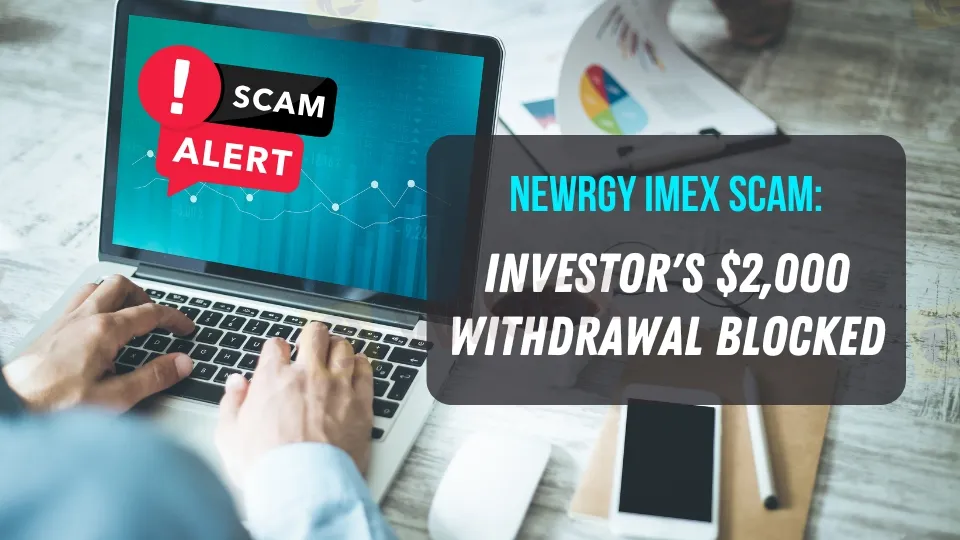简体中文
繁體中文
English
Pусский
日本語
ภาษาไทย
Tiếng Việt
Bahasa Indonesia
Español
हिन्दी
Filippiiniläinen
Français
Deutsch
Português
Türkçe
한국어
العربية
NEWRGY IMEX Scam: Investor's $2,000 Withdrawal Blocked
Abstract:NEWRGY IMEX prevents investors from withdrawing $2,000 in digital currency. Unlicensed broker disappears. Learn how WikiFX can help avoid these dangerous scams.

NEWRGY IMEX Blocks Investors $2,000 Withdrawal and Vanishes Without a Trace
NEWRGY IMEX has left yet another investor in financial despair after a brazen attempt to withhold $2,000 in digital currency. The investor, who tried to withdraw their funds on August 16, 2024, is now unable to access the money, with the total balance of $2,369.08 locked inside the platform, which has since gone offline. NEWRGY IMEX, an unregulated and unlicensed broker, has vanished completely—its website is now inaccessible, and it has no physical office, leaving its victims with nowhere to turn.

The refusal to allow withdrawals is the hallmark of fraudulent brokers, and NEWRGY IMEX‘s sudden disappearance confirms that it was never a legitimate operation to begin with. Investors were lured in with promises of easy transactions, only to face a brick wall when trying to access their own funds. The amount in question, $2,000, maybe life-changing for some, but it’s now stuck in limbo, trapped by a scammer who operated freely without oversight.

What‘s worse, NEWRGY IMEX’s absence of regulatory licensing makes it impossible to hold the broker accountable. Without regulatory protections, investors are left in the dark, helpless as their funds vanish. This incident highlights the importance of verifying a broker‘s legitimacy before entrusting them with your money—because once it’s gone, its often impossible to get back.
How WikiFX Can Save You from Scammers Like NEWRGY IMEX
This is where WikiFX comes in as your lifeline. WikiFX is dedicated to exposing fraudulent brokers like NEWRGY IMEX, offering you the information you need to avoid falling victim to scams. NEWRGY IMEX was flagged early on by WikiFX, with a damning rating of just 1.17 out of 10 and a high potential risk label. If this investor had checked WikiFX before depositing their money, the warning signs would have been glaringly obvious—no regulation, no office, and no guarantees.

WikiFX enables you to verify a broker‘s regulatory status, read reviews from other investors, and get a clear picture of the risks involved. This kind of transparency is crucial in an industry where scams like NEWRGY IMEX prey on those who don’t know where to look for red flags. The inability to withdraw funds, as this case painfully demonstrates, is a common scam tactic, and WikiFX is there to help you avoid it.
Before making any investment, make WikiFX your first stop. It could be the difference between financial security and watching your money disappear into thin air, just like the $2,000 this victim can no longer touch.

Disclaimer:
The views in this article only represent the author's personal views, and do not constitute investment advice on this platform. This platform does not guarantee the accuracy, completeness and timeliness of the information in the article, and will not be liable for any loss caused by the use of or reliance on the information in the article.
Read more

The Hidden Checklist: Five Unconventional Steps to Vet Your Broker
Forex broker scams continue to evolve, employing new tactics to appear credible and mislead unsuspecting traders. Identifying these fraudulent schemes requires vigilance and strategies beyond the usual advice. Here are five effective methods to help traders assess the legitimacy of a forex broker and avoid potential pitfalls.

Doo Financial Obtains Licenses in BVI and Cayman Islands
Doo Financial, a subsidiary of Singapore-based Doo Group, has expanded its regulatory footprint by securing new offshore licenses from the British Virgin Islands Financial Services Commission (BVI FSC) and the Cayman Islands Monetary Authority (CIMA).

CFI’s New Initiative Aims to Promote Transparency in Trading
A new programme has been launched by CFI to address the growing need for transparency and awareness in online trading. Named “Trading Transparency+: Empowering Awareness and Clarity in Trading,” the initiative seeks to combat misinformation and equip individuals with resources to evaluate whether trading aligns with their financial goals and circumstances.

Malaysian-Thai Fraud Syndicate Dismantled, Millions in Losses Reported
The Royal Malaysia Police (PDRM) has received 26 reports concerning the Nicshare and CommonApps investment schemes, both linked to a major fraudulent syndicate led by a Malaysian citizen. The syndicate’s activities came to light following the arrest of its leader by Thai authorities on 16 December.
WikiFX Broker
Latest News
ASIC Sues Binance Australia Derivatives for Misclassifying Retail Clients
Top 10 Trading Indicators Every Forex Trader Should Know
WikiFX Review: Is FxPro Reliable?
Malaysian-Thai Fraud Syndicate Dismantled, Millions in Losses Reported
Trading frauds topped the list of scams in India- Report Reveals
AIMS Broker Review
The Hidden Checklist: Five Unconventional Steps to Vet Your Broker
YAMARKETS' Jingle Bells Christmas Offer!
WikiFX Review: Something You Need to Know About Markets4you
Revolut Leads UK Neobanks in the Digital Banking Revolution
Currency Calculator


